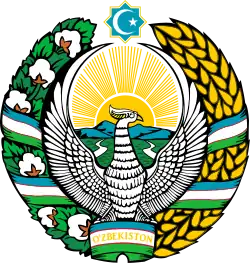2021 Uzbek presidential election
Presidential elections are scheduled to be held in Uzbekistan in March 2021.[1]
|
| |||
| |||
 |
|---|
| This article is part of a series on the politics and government of Uzbekistan |
|
|
| Government |
|
|
The previous presidential election was held in 2016, following the death of incumbent President Islam Karimov on 2 September of that year.[2] The constitution mandated that the election be held within three months of Karimov's death.[3] Interim President Shavkat Mirziyoyev won the elections with 90% of the vote. The elections were described by The Economist as a sham, and by the Organization for Security and Co-operation in Europe as lacking "a genuine choice".[4]
Background
Uzbekistan's political system is seen as tightly controlled;[1] Mirziyoyev, who is eligible under the country's constitution to serve a second term,[1] is considered likely to be reelected in 2021, as there is—according to Farkhod Tolipov, founder of the Uzbek non-governmental research organization Caravan of Knowledge—"not any alternative to him to challenge during the next elections".[5] While a variety of parties ran in the 2019–20 Uzbek parliamentary election, all of them were loyal to president Shavkat Mirziyoyev.[6] But in May 2020, the Uzbek government planned to liberalise its media and electoral laws.[1] It has also claimed that it will ease campaign finance regulations and allow private donations.[1] Mirziyoyev published a draft decree proposing constitutional amendments to replace the then-current majoritarian system for parliamentary elections with a "mixed system that includes some proportional representation".[1]
In November 2020, a delegation led by Uzbek foreign minister Abdulaziz Kamilov visited Washington, D.C.; the United States was "looking to strengthen" its strategic relationship with Uzbekistan, described as the "key regional power broker".[7] The meetings resulted in US$100 million being given to Uzbekistan for economic assistance, and the US pledging support for Uzbekistan's appointment to the United Nations Human Rights Council.[7]
Tolipov said in December 2020 that "despite obvious advancement in reforms in various spheres, one direction of reforms remains very slow: it is the sphere of political reforms".[5] Some reforms had been implemented; Parliament's visibility had been "slightly increased", and fragments of Parliamentary sessions were more often accessible to the public. However, MPs continued to vote unanimously on issues like the appointment of provincial governors, without attempts at debate or pluralistic decisionmaking.[5]
While the Uzbek government's May 2020 announcement promised "liberalization" of media laws,[1] claiming it would no longer use libel and slander laws to imprison journalists and bloggers who criticized it,[1] the Agency of Information and Mass Communications continued to revoke media licenses well into November 2020.[8] The agency claimed in a November 27 statement that, while it was committed to "guaranteeing freedom of speech", the only way to ensure that freedom was by preventing people from saying anything the government decreed to be false;[8] the revocations of media licenses were therefore due to misinformation and disinformation, such as disagreeing with the Uzbek government's claims about COVID-19 statistics. Furthermore, a website had "presented" the opinions of individual Uzbek Internet users as "public opinion", which was forbidden.[9][10] This decision created public and media outrage;[8] the United States embassy in Tashkent said it was "disappointed" by the agency's actions; Daniel Rosenblum, U.S. Ambassador to Uzbekistan, said that "to succeed, Uzbekistan's ambitious reforms require a free & open press. AIMC pressure not consistent with this".[8] The agency, started in 2018 by the president's former press secretary Komil Allomjonov, initially removed many restrictions on what type of posts could be made online in Uzbekistan; however, Allomjonov's successor, Asadjon Khodjaev, is "widely viewed as a representative of an old guard that aims to slow or stall reforms."[8]
Electoral system
The President of Uzbekistan is elected using the two-round system, with a run-off election between the two highest-placed candidates held if no candidate receives an absolute majority of the vote in the first round.[11] The Organization for Security and Co-operation in Europe (OSCE)'s Office for Democratic Institutions and Human Rights (ODIHR), which observed the 2016 elections, reported that the elections lacked real competition because the ruling party was in a much stronger position, and due to limitations on certain freedoms, such as the right for media to report on politics in an unrestricted manner.[12] Other irregularities reported by the OSCE include ballot stuffing and improper proxy voting.[4]
References
- Reuters Staff (22 May 2020). "Uzbekistan to liberalise electoral, media law". Reuters. Retrieved 10 December 2020.
- Uzbekistan to hold presidential election on December 4 Al Jazeera, 9 September 2016
- Uzbekistan's Constitution of 1992 with Amendments through 2011 Constitute
- "Uzbekistan replaces one strongman with another". The Economist. 6 December 2016. ISSN 0013-0613. Retrieved 7 December 2016.
- Putz, Catherine (15 December 2020). "Checking in on Uzbekistan's Political Progress in 2020: An Interview With Farkhod Tolipov". The Diplomat. Retrieved 15 December 2020.
- "Questions over Uzbekistan's new era of 'openness'". British Broadcasting Corporation. 20 December 2019. Retrieved 15 December 2020.
- Le Mieux, Niko (22 November 2020). "Uzbek foreign minister to conclude US visit". Retrieved 15 December 2020.
- Imamova, Navbahor (2 December 2020). "Uzbek Journalists Push Back Against Media Regulator". Retrieved 15 December 2020.
- "РАСМИЙ БАЁНОТ". Республикаси Президенти Администрацияси ҳузуридаги Ахборот ва оммавий коммуникациялар агентлиги. 27 November 2020. Retrieved 15 December 2020.
- "OFFICIAL STATEMENT". Agency of Information and Mass Communications under the Administration of the President of the Republic of Uzbekistan. 30 November 2020. Retrieved 15 December 2020.
- Republic of Uzbekistan IFES
- "Mirziyaev Declared Winner Of Uzbekistan's Presidential Election". RadioFreeEurope/RadioLiberty. Retrieved 7 December 2016.